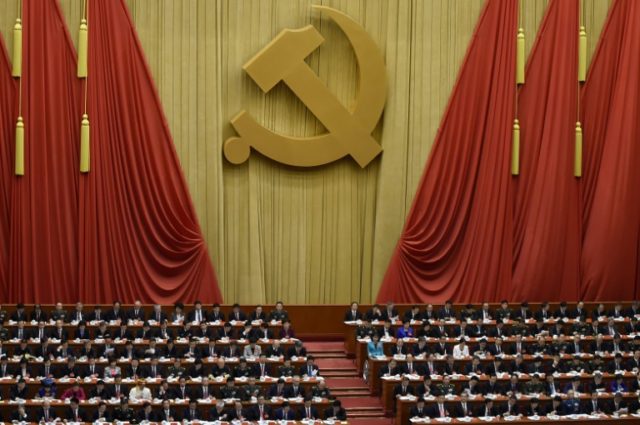The Wall Street Journal reported over the weekend about Communist China’s persistent efforts to poach talented employees and steal data from Taiwanese tech companies, beginning with the case of an engineer who was offered a lucrative senior position he was not remotely qualified for, apparently because Beijing valued his access to sensitive records.
The engineer, Hsu Chih-Peng, was busted while in the process of handing reams of sensitive tech documents he illegally copied from his old Taiwanese employer to his new bosses at the state-owned Shanghai Huali Microelectronics Corporation of China.
The WSJ puts Hsu’s case in the context of a major Chinese initiative to pinch high technology from Taiwan, which makes two-thirds of the world’s semiconductors and supplies most of the major American tech firms with chips:
Technology-theft cases more than doubled to 21 last year from eight in 2013, according to official data. Taiwanese authorities and attorneys say they mostly haven’t indicted Chinese entities believed to be the ultimate beneficiaries, often for political reasons and because they don’t believe they would be able to enforce court judgments on the mainland.
While China manufactures most of the world’s smartphones and computers, it imports almost all the semiconductors needed to provide the logic and memory that run the gadgets. Last year, China paid $260 billion importing chips—60% more than it spent on oil. Chinese leaders want homemade chips to account for 40% of locally produced smartphones by 2025, more than quadruple current levels.
Beijing has $150 billion in funds to develop its own chip industry, frustrated by Washington blocking Chinese takeovers of American manufacturers and efforts to limit investments and exports to prevent the transfer of technology. Last week, Mr. Trump backed away from a plan to create tough new restrictions on U.S. technology exports to China as officials try to diffuse a looming war over tariffs.
Beijing is using its largess to try to lure businesses and engineers across the Taiwan Strait, sometimes dangling fivefold salary increases, and sometimes enticing recruits to bring design blueprints with them, Taiwanese officials say.
Of course, Chinese officials deny they are engaged in a campaign of technology theft, even as Lin Wei-cheng of the Taiwanese Ministry of Justice warns the “poaching is getting more and more serious.” A shockingly high percentage of tech espionage prosecutions in Taiwan lead back to Chinese state-run companies. The targets are often Taiwanese companies that have relationships with American tech firms.
Perhaps most disturbingly, China does not always have to invest a great deal of effort in recruiting Taiwanese operatives. The word seems to be getting out that lucrative accommodations on the mainland await Taiwanese who arrive with pilfered data in hand. One case related by the Wall Street Journal involved a Taiwanese man who essentially applied for a job with a mainland company by sending them smartphone photos of sensitive technology from his current Taiwanese employer.
“Beijing’s pursuit of semiconductor secrets is seen as part of its longstanding goal to reabsorb Taiwan under the mainland government,” the WSJ notes. The most conspiratorial interpretation would be that China’s new push to isolate and demoralize Taiwan, ostensibly driven by the election of independence-minded President Tsai Ing-wen, is actually a gambit to raid Taiwan of its electronic treasures.
Are China’s geopolitical objectives the driving force and tech poaching a side benefit, or the other way around? Undermining the Taiwanese semiconductor industry would jeopardize almost 20 percent of the island’s gross domestic product, which in turn would weaken political resistance to China.
China has been pushing hard to woo young Taiwanese to the mainland over the past four years, an effort that appears to be making younger Taiwanese more fatalistic about the prospects of maintaining their limited independence, even as they express a strong preference for maintaining the status quo.
Conversely, as the WSJ article notes, China’s political effort to isolate Taiwan makes it very difficult to prosecute tech crimes that lead back to the mainland, where the authorities talk about cooperating with Taiwanese police but offer little meaningful assistance.
When the New York Times reported in June on one of the technology theft cases mentioned in the Wall Street Journal, it portrayed the Taiwanese company as scrambling to “conceal a daring case of corporate espionage” perpetrated by employees who sold American designs to China:
As the police raided their offices, human resources workers gave the engineers a warning to scramble and get rid of the evidence. USB drives, laptops and documents were handed to a lower-level employee, who hid them in her locker. Then she walked one engineer’s phone out the front door.
What those devices contained was more valuable than gold or jewels: designs from an American company, Micron Technology, for microchips that have helped power the global digital revolution. According to the Taiwanese authorities, the designs were bound for China, where they would help a new, $5.7 billion microchip factory the size of several airplane hangars rumble into production.
Micron had already rebuffed a $23 billion takeover bid and partnership offers from Chinese companies and was subsequently targeted by lawsuits and investigations in China. In a lawsuit filed against Taiwan’s UMC corporation, Micron alleges that UMC poached engineers from Micron’s offices in Taiwan, convinced them to steal Micron’s advanced memory chip technology, and then sought to deliver that technology to China.
The case was brought to President Donald Trump’s attention in a letter from Senators Jim Risch (R-ID) and Mike Crapo (R-ID), who warned, “If the case against Micron moves forward, and the Chinese government once again rules in favor of itself, it would cause substantial damage to Micron and the U.S. tech industry as a whole.”

COMMENTS
Please let us know if you're having issues with commenting.